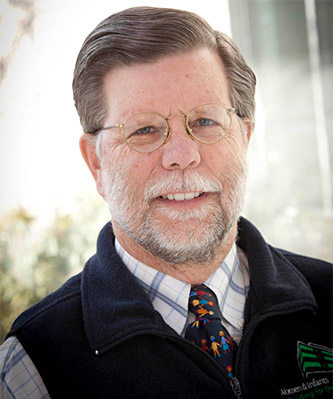 Jim Padbury, MD
Jim Padbury, MD
Program Director, Advance-CTR
Pediatrician-In-Chief, Chief of Neonatal/Perinatal Medicine, Women and Infants Hospital
William and Mary Oh–William and Elsa Zopfi Professor of Pediatrics, Perinatal Research, Brown University
Vice Chair for Basic and Translational Research, Hasbro Children’s Hospital Department of Pediatrics
What does translational research mean to you?
To me, translational research means accelerating the rate of implementation and the impact of research on clinical outcomes and health -- at both the individual level and the population level. We at Advance-CTR are excited to contribute to this effort. We see great opportunities in basic science research and in so-called bench-to-bedside approaches. There are equally important and valuable advances that can be made in clinical effectiveness research by extrapolating results from research projects to larger patient groups.
But, finally, translational research to me means making an impact on the community and on overall health. In an ideal world, a virtuous circle would link each of these elements of the translational continuum.
What are the greatest health priorities facing Rhode Islanders?
Rhode Island faces many significant health problems. This includes reducing the incidence and impact of communicable diseases like HIV and Hepatitis C. There are effective therapies for both of these important diseases and targeting them on the most vulnerable populations in a thoughtful way will help us continue our journey to zero horizontal transmission of these disorders. The Opioid epidemic has impacted all geographic regions, populations and various groups in the United States and is an important problem. It will be addressed only by multiple different approaches. Pre-, perinatal and postpartum health of mothers and children is an investment in our future. While we have great resources and a very well- regionalized system of care here in Rhode Island, the abundance of other chronic illnesses (diabetes, heart disease, and behavioral and mental health disorders) contributes to suboptimal outcomes for both moms and their newborns. These are areas where organized approaches to population health can yield lasting dividends with our aging population and a growing cohort of baby boomers. The specialized health care needs and the population health care needs of senior citizens will also contribute to opportunities for translational advances.
What research developments or discoveries are you most excited about?
There is a growing consortium of investigators contributing to Alzheimer’s and other memory disorders. Excellent new investigators have been recruited to our state including Professor Paula Grammas at the University of Rhode Island whose work is demonstrating the importance of vascular biology in Alzheimer’s disease. Professor Stephen Salloway at Butler Hospital is heavily engaged in clinical trials for the prevention and treatment of Alzheimer’s disease, mild cognitive impairment and vascular dementia studies of genetic and sporadic forms of brain disease. Remarkably, at Women and Infants Hospital, Dr. Surendra Sharma has identified misfolded proteins in the serum of women with severe preeclampsia that provides clues into the cause of this important disorder and also links to Alzheimer’s disease. He and other collaborators have shown a significant epidemiologic link to the risk of Alzheimer’s disease in later life following preeclampsia. His mechanistic studies in humanized mouse models are linking these two important disorders in new and unexpected ways.
What’s the biggest misconception about translational research?
The biggest misconception about translational research is that it is all one type of approach. In some programs it is all considered bench-to-bedside. Other groups emphasize population-based research and epidemiology. In an ideal world, and also with what we are working to promote and foster at Advance-CTR, there is a continuum linking each of these areas of investigation. The most successful investigators will find ways to collaborate across these approaches and enhance each other’s success.
What do you want investigators who are interested in translational research to know?
We want investigators who are interested in translational research to know about the resources that we now have. Advance-CTR will provide resources to support substantial Pilot Project awards in translational research. We will also be supporting faculty development awards for protected time and stipends to allow formal training and translational research up to the Master's level. Additionally, we are offering investigators "storefront" of research services in biostatistics, clinical research, and biomedical informatics. We are working hard to extend these resources across all of the participating organizations in our consortium (Brown University, the University of Rhode Island, Lifespan, Care New England, the Providence VA Medical Center, and the Rhode Island Quality Institute), the other academic centers across the state and to researchers at large. We are working hard to get the message out that, for translational research, the time has come: if not us, if not now, when?
What is the best advice you ever received?
The best advice I ever got is “the definition of luck is where hard work meets opportunity.” Success in any field of science, translational or otherwise, is a series of many individual pieces of good advice, opportunity and incremental successes. The greatest joy in the world of research is the affirmation of contributing anything, even a small piece of additional information to the greater good in the body of science and medicine that we all revere. My own career has seen extraordinary scientific advancements from my close friends and colleagues including the development of haemophilus influenza vaccine, the development of surfactant and its clinical application and the use of evidence-based practice to systematically move knowledge and discovery out to patients. We are inspired at Advance-CTR to play our role in helping continue this progress.